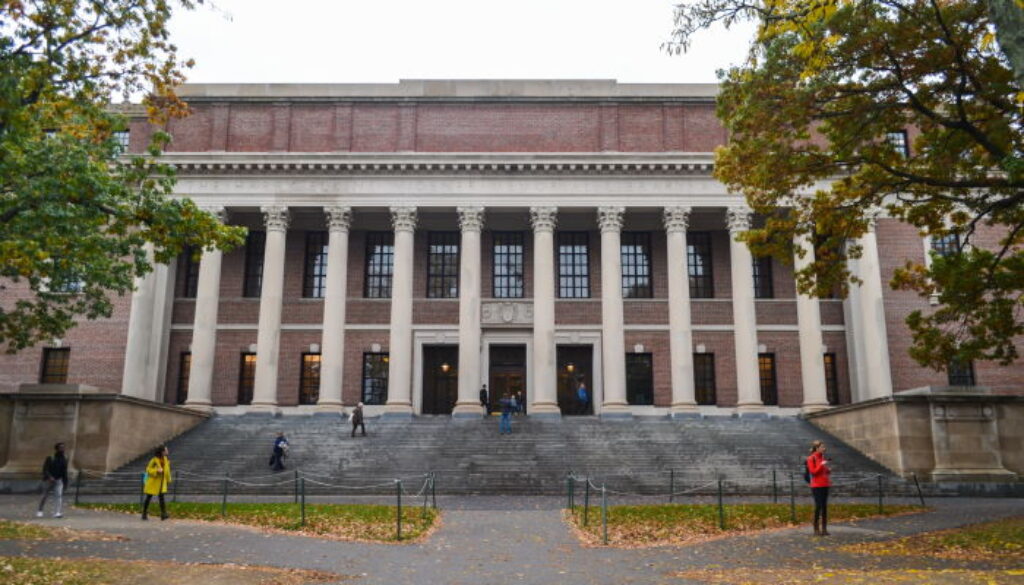Ivy League Senior Regretfully Writes: Harvard Students Are COVID Sheep
Cambridge, Mass.
Harvard undergraduates received disappointing news on Feb. 10. Our student government representatives sent an email after a meeting with the Committee on Student Life, writing that “due to the constraints of the pandemic, Housing Day will not operate the same way as it has in the past.”
Housing Day is one of Harvard’s unique traditions, a day when campus comes alive. Sophomores, juniors and seniors storm freshman dormitories to tell first-year students which of the 12 “houses,” essentially big dorms for upperclassmen, they will live in for their remaining time on campus. Having lost two of these days during the 17 months that Harvard sent us home, I was excited to participate in one more traditional Housing Day my senior year. Instead, the student government said it would likely be a modified outdoor event. When I inquired about this to Harvard College Dean Rakesh Khurana, he was polite and warm but told me he couldn’t provide more specifics or predict what the event might look like.
I still feel we’ve been cheated.This decision is the latest in a long list of Covid-related excesses. Harvard has required students to get vaccinated and boosted and test for Covid twice a week, hectored us to wear masks nearly everywhere, and banned students from several communal spaces, including dining halls at one point, and from having informal campus gatherings indoors with more than 10 people. Most of my classmates lost nearly a third of their time on campus. The aggregate burden of these measures over two years—combined with the discouraging realization that many of them do little to protect public health—has diminished our college experience.
The administration has managed to implement all these measures without serious objection because of this hard truth: For most Harvard undergrads, our lives during Covid aren’t that different from the way they have always been.
To get into this university, we chose to detach ourselves from normal human experiences, neglecting our interests, hobbies, robust social lives—anything that couldn’t appear on a college application or be touted in an interview. Almost everything in life was subordinate to whatever was necessary to get into college. Once we arrived on campus, we certainly had more fun than we did in high school, but our tendency to conform hasn’t gone away, especially as we pursue our next goal, whether at Goldman Sachs or in graduate school. There is little difference between mask compliance and the grueling sports practices and marathon study sessions we did in high school. Covid restrictions are simply requirements we tolerate to attain the next credential.
For many of us, the Covid decrees over the past two years have been a relief. They have given us an excuse to retreat to our phones and computers, write papers and study for our GMATs. They allow us to avoid asking hard questions: Am I living the life I want to live? Have I put myself out there enough, taken enough risks, had enough fun?
Our life’s mission has been to please those who can grant or withhold approval: parents, teachers, coaches, admissions officers and job interviewers. As a result, many of us don’t know what we believe or what matters to us.
There is a smaller group at Harvard that apparently find pleasure in these restrictions. These students will chastise you for not wearing a mask correctly and called one of my brave peers who publicly denounced Harvard’s Covid restrictions a “eugenicist” because he supposedly showed insufficient sensitivity to immunocompromised people. They love Covid for the moral high ground it gives them to condescend to and control others.
My peers and I are often told that we are the future leaders of America. We may be the future decision makers, but most of us aren’t leaders. Our principal concern is becoming members of the American elite, with whatever compromises, concessions and conformity that requires. The inability of Harvard students to question or oppose these irrational bureaucratic excesses bodes ill for our ability to meet future challenges.
Ms. Hartman is a senior at Harvard. In March, she will begin a weekly podcast with Dennis Prager, “Dennis and Julie,” produced by the Salem Podcast Network.




